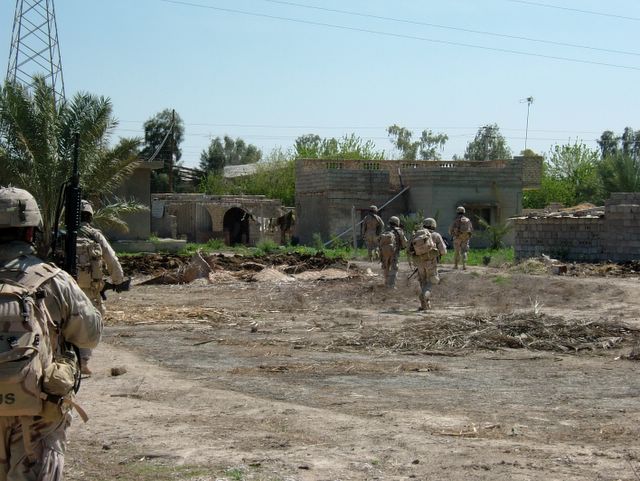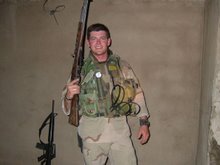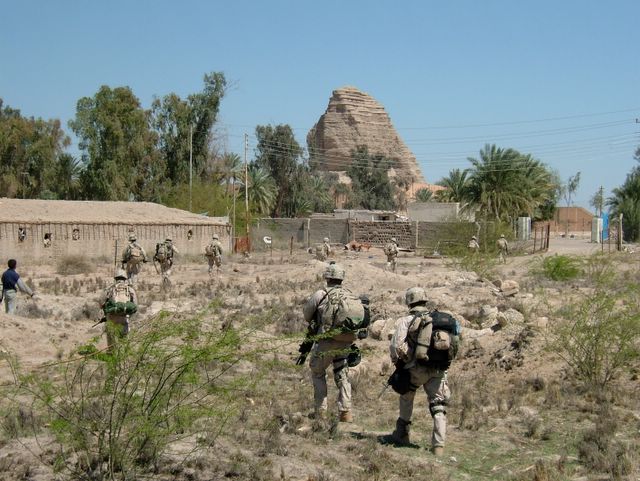Immunity deal hampers Blackwater inquiry
By LARA JAKES JORDAN, Associated Press Writer
The State Department promised Blackwater USA bodyguards immunity from prosecution in its investigation of last month's deadly shooting of 17 Iraqi civilians, The Associated Press has learned.
The immunity deal has delayed a criminal inquiry into the Sept. 16 killings and could undermine any effort to prosecute security contractors for their role in the incident that has infuriated the Iraqi government.
"Once you give immunity, you can't take it away," said a senior law enforcement official familiar with the investigation.
State Department officials declined to confirm or deny that immunity had been granted. One official — who refused to be quoted by name_ said: "If, in fact, such a decision was made, it was done without any input or authorization from any senior State Department official in Washington."
Justice Department spokesman Dean Boyd and FBI spokesman Rich Kolko declined comment.
FBI agents were returning to Washington late Monday from Baghdad, where they have been trying to collect evidence in the Sept. 16 embassy convoy shooting without using statements from Blackwater employees who were given immunity.
Three senior law enforcement officials said all the Blackwater bodyguards involved — both in the vehicle convoy and in at least two helicopters above — were given the legal protection as investigators from the Bureau of Diplomatic Security sought to find out what happened. The bureau is an arm of the State Department.
The law enforcement and State Department officials agreed to speak only if they could remain anonymous because of the sensitivity of the inquiry into the incident.
The investigative misstep comes in the wake of already-strained relations between the United States and Iraq, which is demanding the right to launch its own prosecution of the Blackwater bodyguards.
Blackwater spokeswoman Anne Tyrrell declined comment about the U.S. investigation. Based in Moyock, N.C., Blackwater USA is the largest private security firm protecting U.S. diplomats in Iraq.
The company has said its Sept. 16 convoy was under attack before it opened fire in west Baghdad's Nisoor Square, killing 17 Iraqis. A follow-up investigation by the Iraqi government, however, concluded that Blackwater's men were unprovoked. No witnesses have been found to contradict that finding.
An initial incident report by U.S. Central Command, which oversees military operations in Iraq, also indicated "no enemy activity involved" in the Sept. 16 incident. The report says Blackwater guards were traveling against the flow of traffic through a traffic circle when they "engaged five civilian vehicles with small arms fire" at a distance of 50 meters.
The FBI took over the case early this month, officials said, after prosecutors in the Justice Department's criminal division realized it could not bring charges against Blackwater guards based on their statements to the Diplomatic Security investigators.
Officials said the Blackwater bodyguards spoke only after receiving so-called "Garrity" protections, requiring that their statements only be used internally — and not for criminal prosecutions.
At that point, the Justice Department shifted the investigation to prosecutors in its national security division, sealing the guards' statements and attempting to build a case based on other evidence from a crime scene that was then already two weeks old.
The FBI has re-interviewed some of the Blackwater employees, and one official said Monday that at least several of them have refused to answer questions, citing their constitutional right to avoid self-incrimination. Any statements that the guards give to the FBI could be used to bring criminal charges.
A second official, however, said that not all the guards have cited their Fifth Amendment right against self-incrimination — leaving open the possibility for future charges. The official declined to elaborate.
Prosecutors will have to prove that any evidence they use in bringing charges against Blackwater employees was uncovered without using the guards' statements to State Department investigators. They "have to show we got the information independently," one official said.
Garrity protections generally are given to police or other public law enforcement officers, and were extended to the Blackwater guards because they were working on behalf of the U.S. government, one official said. Experts said it's rare for them to be given to all or even most witnesses — particularly before a suspect is identified.
"You have to be careful," said Michael Horowitz, a former federal prosecutor in Manhattan and senior Justice Department official. "You have to understand early on who your serious subjects are in the investigation, and avoid giving these people the protections."
It's not clear why the Diplomatic Security investigators agreed to give immunity to the bodyguards, or who authorized doing so.
Bureau of Diplomatic Security chief Richard Griffin last week announced his resignation, effective Thursday. Senior State Department officials, speaking on condition of anonymity, have said his departure was directly related to his oversight of Blackwater contractors.
Tyrrell, the Blackwater spokeswoman, said the company was alerted Oct. 2 that FBI would be taking over the investigation from the State Department. She declined further comment.
On Oct. 3, State Department Sean McCormack said the FBI had been called in to assist Diplomatic Security investigators. A day later, he said the FBI had taken over the probe.
"We, internally and in talking with the FBI, had been thinking about the idea of the FBI leading the investigation for a number of different reasons," McCormack told reporters during an Oct. 4 briefing.
Last week, Secretary of State Condoleezza Rice ordered a series of measures to boost government oversight of the private guards who protect American diplomats in Iraq. They include increased monitoring and explicit rules on when and how they can use deadly force.
Blackwater's contract with the State Department expires in May and there are questions whether it will remain as the primary contractor for diplomatic bodyguards. Iraqi Prime Minister Nouri al-Maliki has said his Cabinet is drafting legislation that would force the State Department to replace Blackwater with another security company.
Congress also is expected to investigate the shootings, but a House watchdog committee said it has so far held off, based on a Justice Department request that lawmakers wait until the FBI concludes its inquiry.
___
Associated Press writers Matthew Lee and Lolita C. Baldor contributed to this story.












